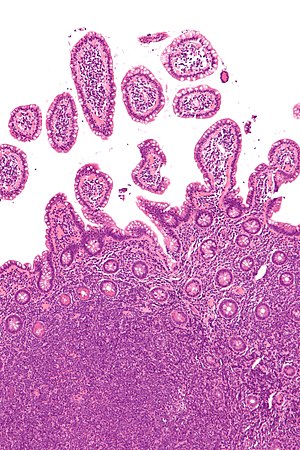Difference between revisions of "Mantle cell lymphoma"
Jump to navigation
Jump to search
| Line 80: | Line 80: | ||
==Molecular== | ==Molecular== | ||
*t(11;14)(q13;q32) / IGH-CCND1.<ref>URL: [http://atlasgeneticsoncology.org/Anomalies/t1114ID2021.html http://atlasgeneticsoncology.org/Anomalies/t1114ID2021.html]. Accessed on: 10 August 2010.</ref> | *t(11;14)(q13;q32) / IGH-CCND1.<ref>URL: [http://atlasgeneticsoncology.org/Anomalies/t1114ID2021.html http://atlasgeneticsoncology.org/Anomalies/t1114ID2021.html]. Accessed on: 10 August 2010.</ref> | ||
==Sign out== | |||
<pre> | |||
TERMINAL ILEUM, BIOPSY: | |||
- MANTLE CELL LYMPHOMA. | |||
COMMENT: | |||
The tumour consists of small lymphoid cells in sheets. | |||
The tumour stains as follows: | |||
POSITIVE: CD20, CD5, BCL2, cyclin D1. | |||
NEGATIVE: CD23, BCL6, CD10. | |||
PROLIFERATION (Ki-67): 25%. | |||
</pre> | |||
==See also== | ==See also== | ||
*[[Small cell lymphomas]]. | *[[Small cell lymphomas]]. | ||
*[[Ileal lymphoid hyperplasia]]. | |||
==References== | ==References== | ||
Revision as of 17:59, 22 May 2014
| Mantle cell lymphoma | |
|---|---|
| Diagnosis in short | |
 Mantle cell lymphoma. H&E stain. | |
|
| |
| LM | small monomorphic (uniform size, shape and staining) lymphoid population with abundant mitoses, +/-scattered epithelioid histiocytes (should not be confused with tingible-body macrophages), +/-sclerosed blood vessels |
| Subtypes | blastic variant |
| LM DDx | other small cell lymphomas (esp. MALT lymphoma), Burkitt lymphoma |
| IHC | cyclin D1 +ve, CD5 +ve, CD43 +ve, CD20 +ve, CD23 -ve |
| Molecular | t(11;14)(q13;q32) / IGH-CCND1 |
| Site | lymph node, GI tract, other sites |
|
| |
| Prevalence | not common |
| Prognosis | moderately aggressive to poor |
Mantle cell lymphoma, abbreviated MCL, is less common small cell lymphoma that is relatively aggressive when compared to other small cell lymphomas.
General
- Relatively aggressive - guarded prognosis.[1]
- Rare ~ 2% of non-Hogkin's lymphoma in a series of over 4000 patients.[2]
GI tract - typically:[3]
- Abdominal pain (~37% of cases) or GI bleeding (~26% of cases).
Gross
- GI tract: polypoid lesions (~50% of cases).[3]
Microscopic
Features:[4]
- Typically a small monomorphic (uniform size, shape and staining) lymphoid population.
- May be "large" (blastic variant of mantle cell lymphoma) with 1 or 2 nucleoli.[5]
- Abundant mitoses.
- Scattered epithelioid histiocytes (should not be confused with tingible-body macrophages).
- Sclerosed blood vessels.
DDx:
- Other small cell lymphomas, esp. marginal zone lymphoma.
- Burkitt's lymphoma.
- Large B-cell lymphoma - for blastic variant of MCL.[6]
Images
www:
IHC
- CD45 +ve.
- CD20 +ve.
- CD79a +ve.
- CD5 +ve -- important.
- Negative in case reports.[7]
- CD43 +ve.
- Cyclin D1 +ve -- key immunostain.
Others:
- CD23 -ve.
- Positive in CLL.
Molecular
- t(11;14)(q13;q32) / IGH-CCND1.[9]
Sign out
TERMINAL ILEUM, BIOPSY: - MANTLE CELL LYMPHOMA. COMMENT: The tumour consists of small lymphoid cells in sheets. The tumour stains as follows: POSITIVE: CD20, CD5, BCL2, cyclin D1. NEGATIVE: CD23, BCL6, CD10. PROLIFERATION (Ki-67): 25%.
See also
References
- ↑ Hankin, RC.; Hunter, SV. (Dec 1999). "Mantle cell lymphoma.". Arch Pathol Lab Med 123 (12): 1182-8. doi:10.1043/0003-9985(1999)1231182:MCL2.0.CO;2. PMID 10583923.
- ↑ Gujral S, Agarwal A, Gota V, et al. (2008). "A clinicopathologic study of mantle cell lymphoma in a single center study in India". Indian J Pathol Microbiol 51 (3): 315–22. PMID 18723950.
- ↑ 3.0 3.1 Kim, JH.; Jung, HW.; Kang, KJ.; Min, BH.; Lee, JH.; Chang, DK.; Kim, YH.; Son, HJ. et al. (2012). "Endoscopic findings in mantle cell lymphoma with gastrointestinal tract involvement.". Acta Haematol 127 (3): 129-34. doi:10.1159/000333139. PMID 22236942.
- ↑ Good, D. 17 August 2010.
- ↑ Todorovic M, Pavlovic M, Balint B, et al. (2007). "Immunophenotypic profile and clinical characteristics in patients with advanced stage mantle cell lymphoma". Med. Oncol. 24 (4): 413–8. PMID 17917091.
- ↑ Bernard M, Gressin R, Lefrère F, et al. (November 2001). "Blastic variant of mantle cell lymphoma: a rare but highly aggressive subtype". Leukemia 15 (11): 1785–91. PMID 11681422.
- ↑ URL: http://path.upmc.edu/cases/case308/dx.html. Accessed on: 14 January 2012.
- ↑ Online 'Mendelian Inheritance in Man' (OMIM) 168461
- ↑ URL: http://atlasgeneticsoncology.org/Anomalies/t1114ID2021.html. Accessed on: 10 August 2010.



